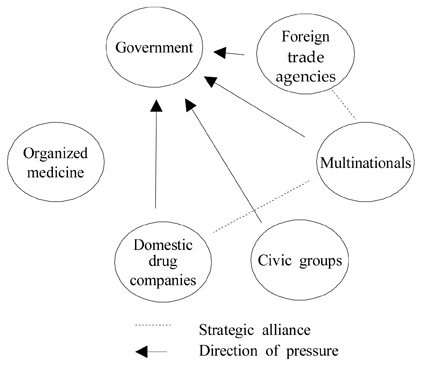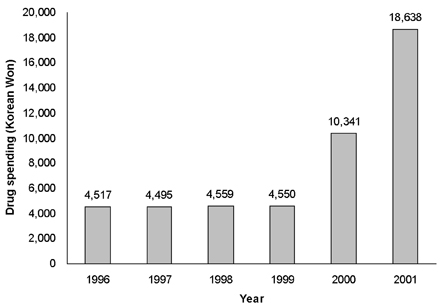Yonsei Med J.
2005 Jun;46(3):321-330. 10.3349/ymj.2005.46.3.321.
Interest Groups' Influence over Drug Pricing Policy Reform in South Korea
- Affiliations
-
- 1Department of Health Policy and Management, Graduate School of Public Health, Yonsei University, Seoul, Korea.
- 2Department of Preventive Medicine, Yonsei University College of Medicine, Seoul, Korea. kimhj@yumc.yonsei.ac.kr
- KMID: 1734065
- DOI: http://doi.org/10.3349/ymj.2005.46.3.321
Abstract
- In 1999, the Korean government made a drug pricing policy reform to improve the efficiency and transparency of the drug distribution system. Yet, its policy formation process was far from being rational. Facing harsh resistance from various interest groups, the government changed its details into something different from what was initially investigated and planned. So far, little evidence supports any improvement in Korea's drug distribution system. Instead, the new drug pricing policy has deteriorated Korea's national health insurance budget, indicating a heavier economic burden for the general public. From Korea's experience, we may draw some lessons for the future development of a better health care system. As a society becomes more pluralistic, the government should come out of authoritarianism and thoroughly prepare in advance for resistance to reform, by making greater efforts to persuade strong interest groups while informing the general public of potential benefits of the reform. Additionally, facing developing civic groups, the government should listen but not rely too much on them at the final stage of the policy formation. Many of the civic groups lack expertise to evaluate the details of policy and tend to act in a somewhat emotional way.
Keyword
MeSH Terms
Figure
Reference
-
1. Ahmad K. Korean doctors end crippling strike. Lancet. 2000. 356:54.2. Lee CC, Crupi RS, Kim GW, Min YG. A challenge for reform in South Korea. Yonsei Med J. 2001. 42:152–153.3. Watt J. Doctors' first strike in Republic of Korea likely to end. Bull World Health Organ. 2000. 78:1478.4. Kwon S. Pharmaceutical reform and physician strike in Korea: separation of drug prescribing and dispensing. Soc Sci Med. 2003. 57:529–538.5. Kim HJ, Chung W, Lee SG. Lessons from Korea's pharmaceutical policy reform: the separation of medical institutions and pharmacies for outpatient care. Health Policy. 2004. 68:267–275.6. Beaufort BL. Health policymaking in the United States. 1998. 2nd ed. Chicago, Illinois: Health Administration Press.7. Rodwin MA, Okamoto A. Physicians' conflicts of interest in Japan and the United States: Lessons for the United States. J Health Polit Policy Law. 2000. 25:343–375.8. Morone JA, Kilbreth EH. Power to the people? Restoring citizen participation. J Health Polit Policy Law. 2003. 28:271–288.9. Korea Pharmaceutical Manufacturers Association. Policy measures for pharmaceutical industry in the 21st century. 1997. Seoul, Korea: Korea Pharmaceutical Manufacturers Association;Unpublished document.10. Korea Ministry of Health and Welfare. Report on policy measures for improving drug reimbursement pricing policy. 1999. Seoul, Korea: Korea Ministry of Health and Welfare;Unpublished document.11. Research Institute for Health Policy and Management. Developing the resource-based relative value system in Korea. 1997. Seoul, Korea: Yonsei University.12. Korea Ministry of Health and Welfare. Fee schedules for medical insurance. 1998. Seoul, Korea: Korea Ministry of Health and Welfare.13. Chung W. The political economy of health policy decision-making: Korea's drug pricing policy reform. Korean Policy Studies Review. 2002. 11:99–134.14. Cho HY. Democratic transition and changes in Korean NGOs. In : Paper presented at the 1999 Seoul International Conference of NGOs; 12 October 1999; Seoul, Korea: CONGO, NGO/DPI of UN and GCS.15. NGOs movement without citizens. Weekly Hankook. 12 September 2002, 2000. Available at: http://www.hankooki.com/whan/200010/w200010312255446151282.htm.16. People's Solidarity for Participatory Democracy of Korea. Survey report of drug transactions. 1998. Seoul, Korea: People's Solidarity for Participatory Democracy of Korea;Unpublished document.17. Cho BH. Separation of prescription and dispensing, and social conflicts. In : Paper presented at the 2000 Fall Annual Meeting of The Korean Society of Health Policy and Administration; 8-9 December 2000; Seoul, Korea.18. Ahn BC. The political character and feature in policy formation process: A case study on separation of prescribing and dispensing drugs. Korean Policy Studies Review. 2001. 10:23–55.19. Chung W. Proposal for reimbursement pricing for innovative drugs. 1999. Seoul, Korea: Korea Institute for Health and Social Welfare;Unpublished document.20. Health Care Reform Committee. Health care policy agenda for 21st century. 1997. Seoul, Korea: Health Care Reform Committee.21. Chung W, Hwang I, Chae YM, Lim J. Policy recommendations for health insurance drug pricing. 1998. Seoul, Korea: Korea Institute for Health and Social Affairs.22. Moonhwailbo. The multinational drug companies lobbying to increase prices of their products. 1999. 06. 23. Seoul, Korea: Moonhwailbosa.23. Drug Pricing Commission of the National Health Insurance. Final report of the task force for revising drug pricing policy. 2000. Seoul, Korea: Ministry of Health and Social Affairs;Unpublished document.24. Bureau of Health Insurance and Pension. Report of policy measures for improving drug reimbursement pricing policy. 1999. Seoul, Korea: Ministry of Health and Welfare;Unpublished document.25. Korea Ministry of Health and Welfare. Overview of health insurance system in Korea. 2001. Seoul, Korea: Korea Ministry of Health and Welfare;Unpublished document.26. Bae EY, Kim JH. Pharmaceutical price regulation in Korea. 2002. Seoul, Korea: Korea Institute for Health and Social Welfare.27. Korea Pharmaceutical Manufacturers Association. Policy recommendations for the pharmaceutical industry in the 21st century. 2001. Seoul, Korea: Korea Pharmaceutical Manufacturers Association;Unpublished document.28. Bae EY. The impact of the separation of prescription and dispensing on pharmaceutical industry. Health and Welfare Policy Forum. 2002. 64:31–39.29. Kookminilbo. The multinational drug companies making huge amount of profits in Korea. 2002. 09. 26. Seoul, Korea: Kookminilbosa.30. Lee GS. Problems of current drug pricing policy and its policy measures. 2001. In : Paper presented at a public hearing for revising the drug pricing policy; Seoul, Korea: Korea Hospital Association.31. Major indicators of the national health insurance by year. Korea National Health Insurance Corporation. 2003. 20 September 2003. Available at: www.national health insurancec.or.kr/jaryo/TWEBC02_04_htm/years02.htm.32. Korea National Health Insurance Corporation. Comparative study of the utilization pattern under the national health insurance in Korea. 2002. Seoul, Korea: Korea National Health Insurance Corporation;Unpublished document.33. Korea Ministry of Planning and Budget. Report on the measures for stabilizing the national health insurance budget. 2002. Seoul, Korea: Korea Ministry of Planning and Budget;Unpublished document.34. Korea Ministry of Health and Welfare. Report on a survey of drug transactions. 2002. Seoul, Korea: Korea Ministry of Health and Welfare;Unpublished document.35. Gross DJ, Ratner J, Perez J, Glavin SL. International pharmaceutical spending control: France, Germany, Sweden and the United Kingdom. Health Care Financ Rev. 1994. 15:127–140.36. Pickering PEM. Pricing and reimbursement in Europe: A concise guide. A Pharma Pricing Review Report. 1996. Dorking, Surrey, England: PPR Communications.
- Full Text Links
- Actions
-
Cited
- CITED
-
- Close
- Share
- Similar articles
-
- Policy alternatives of drug cost containment in health insurance
- Determinants of Welfare Attitudes towards Healthcare Services: Focusing on Self-Interest, Symbolic Attitude, and Sociotropic Perceptions
- Understanding American Health Care Reform, 1910-1932: Toward an Interpretive History of Health Policy
- The Effect of Reform of New-Diagnosis Related Groups (KDRGs) on Accuracy of Payment
- Achievements and Challenges of 40th Anniversary Health Insurance





